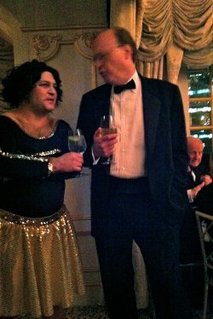
One-Percent Jokes and Plutocrats in Drag
Adapted from Kevin Roose’s book:Young Money, published today by Grand Central Publishing.
“Good evening, Exalted High Council, former Grand Swipes, Grand Swipes-in-waiting, fellow Wall Street Kappas, Kappas from the Spring Street and Montgomery Street chapters, and worthless neophytes!”
Ross's statement seemed particularly odd, because two years ago, I met Ross at an event that might single-handedly explain why the rest of the country still hates financial tycoons – the annual black-tie induction ceremony of a secret Wall Street fraternity called Kappa Beta Phi.
It was January 2012, and Ross, wearing a tuxedo and purple velvet moccasins embroidered with the fraternity’s Greek letters, was standing at the dais of the St. Regis Hotel ballroom, welcoming a crowd of two hundred wealthy and famous Wall Street figures to the Kappa Beta Phi dinner. Ross, the leader (or “Grand Swipe”) of the fraternity, was preparing to invite 21 new members — “neophytes,” as the group called them — to join its exclusive ranks.
During his introductory remarks, Ross spoke for several minutes about the legend of Kappa Beta Phi – how it had been started in 1929 by “four C+ William and Mary students”; how its crest, depicting a “macho right hand in a proper Savile Row suit and a Turnbull and Asser shirtsleeve,” was superior to that of its namesake Phi Beta Kappa (Ross called Phi Beta Kappa’s ruffled-sleeve logo a “tacit confession of homosexuality”); and how the fraternity’s motto, “Dum vivamus edimus et biberimus,” was Latin for “While we live, we eat and drink.”
On cue, the financiers shouted out in a thundering bellow: “DUM VIVAMUS EDIMUS ET BIBERIMUS.”
I’d heard whisperings about the existence of Kappa Beta Phi, whose members included both incredibly successful financiers (New York City's Mayor Michael Bloomberg, former Goldman Sachs chairman John Whitehead, hedge-fund billionaire Paul Tudor Jones) and incredibly unsuccessful ones (Lehman Brothers CEO Dick Fuld, Bear Stearns CEO Jimmy Cayne, former New Jersey governor and MF Global flameout Jon Corzine). It was a secret fraternity, founded at the beginning of the Great Depression, that functioned as a sort of one-percenter’s Friars Club. Each year, the group’s dinner features comedy skits, musical acts in drag, and off-color jokes, and its group’s privacy mantra is “What happens at the St. Regis stays at the St. Regis.” For eight decades, it worked. No outsider in living memory had witnessed the entire proceedings firsthand.
I wanted to break the streak for several reasons. As part of my research for my book,Young Money, I’d been investigating the lives of young Wall Street bankers – the 22-year-olds toiling at the bottom of the financial sector’s food chain. I knew what made those people tick. But in my career as a financial journalist, one question that proved stubbornly elusive was what happened to Wall Streeters as they climbed the ladder to adulthood. Whenever I’d interviewed CEOs and chairmen at big Wall Street firms, they were always too guarded, too on-message and wrapped in media-relations armor to reveal anything interesting about the psychology of the ultra-wealthy. But if I could somehow see these barons in their natural environment, with their defenses down, I might be able to understand the world my young subjects were stepping into.
So when I learned when and where Kappa Beta Phi’s annual dinner was being held, I knew I needed to try to go.
Getting in was shockingly easy — a brisk walk past the sign-in desk, and I was inside cocktail hour. Immediately, I saw faces I recognized from the papers. I picked up an event program and saw that there were other boldface names on the Kappa Beta Phi membership roll — among them, then-Citigroup CEO Vikram Pandit, BlackRock CEO Larry Fink, Home Depot billionaire Ken Langone, Morgan Stanley bigwig Greg Fleming, and JPMorgan Chase vice chairman Jimmy Lee. Any way you count, this was one of the most powerful groups of business executives in the world. (Since I was a good 20 years younger than any other attendee, I suspect that anyone taking note of my presence assumed I was a waiter.)
I hadn’t counted on getting in to the Kappa Beta Phi dinner, and now that I had gotten past security, I wasn’t sure quite what to do. I wanted to avoid rousing suspicion, and I knew that talking to people would get me outed in short order. So I did the next best thing — slouched against a far wall of the room, and pretended to tap out emails on my phone.
• Paul Queally, a private-equity executive with Welsh, Carson, Anderson, & Stowe, told off-color jokes to Ted Virtue, another private-equity bigwig with MidOcean Partners. The jokes ranged from unfunny and sexist (Q: “What’s the biggest difference between Hillary Clinton and a catfish?” A: “One has whiskers and stinks, and the other is a fish”) to unfunny and homophobic (Q: “What’s the biggest difference between Barney Frank and a Fenway Frank?” A: “Barney Frank comes in different-size buns”).
Bill Mulrow, a top executive at the Blackstone Group (who was later appointed chairman of the New York State Housing Finance Agency), and Emil Henry, a hedge fund manager with Tiger Infrastructure Partners and formerassistant secretary of the Treasury, performed a bizarre two-man comedy skit. Mulrow was dressed in raggedy, tie-dye clothes to play the part of a liberal radical, and Henry was playing the part of a wealthy baron. They exchanged lines as if staging a debate between the 99 percent and the 1 percent. (“Bill, look at you! You’re pathetic, you liberal! You need a bath!” Henry shouted. “My God, you callow, insensitive Republican! Don’t you know what we need to do? We need to create jobs,” Mulrow shot back.)
• David Moore, Marc Lasry, and Keith Meister — respectively, a holding company CEO, a billionaire hedge-fund manager, and an activist investor — sang a few seconds of a finance-themed parody of “YMCA” before getting the hook.
• Warren Stephens, an investment banking CEO, took the stage in a Confederate flag hat and sang a song about the financial crisis, set to the tune of “Dixie.” (“In Wall Street land we’ll take our stand, said Morgan and Goldman. But first we better get some loans, so quick, get to the Fed, man.”)
A few more acts followed, during which the veteran Kappas continued to gorge themselves on racks of lamb, throw petits fours at the stage, and laugh uproariously. Michael Novogratz, a former Army helicopter pilot with a shaved head and a stocky build whose firm, Fortress Investment Group, had made him a billionaire, was sitting next to me, drinking liberally and annotating each performance with jokes and insults.
“Can you fuckin’ believe Lasry up there?” Novogratz asked me. I nodded. He added, “He just gave me a ride in his jet a month ago.”
The neophytes – who had changed from their drag outfits into Mormon missionary costumes — broke into their musical finale: a parody version of “I Believe,” the hit ballad from The Book of Mormon, with customized lyrics like “I believe that God has a plan for all of us. I believe my plan involves a seven-figure bonus.” Amused, I pulled out my phone, and began recording the proceedings on video. Wrong move.
“Who the hell are you?” Novogratz demanded.
I felt my pulse spike. I was tempted to make a run for it, but – due to the ethics code of the New York Times, my then-employer – I had no choice but to out myself.
“I’m a reporter,” I said. Novogratz stood up from the table. "You’re not allowed to be here," he said. I, too, stood, and tried to excuse myself, but he grabbed my arm and wouldn’t let go.
“Give me that or I’ll fucking break it!” Novogratz yelled, grabbing for my phone, which was filled with damning evidence. His eyes were bloodshot, and his neck veins were bulging. The song onstage was now over, and a number of prominent Kappas had rushed over to our table. Before the situation could escalate dangerously, a bond investor and former Grand Swipe named Alexandra Lebenthal stepped in between us. Wilbur Ross quickly followed, and the two of them led me out into the lobby, past a throng of Wall Street tycoons, some of whom seemed to be hyperventilating.
Once we made it to the lobby, Ross and Lebenthal reassured me that what I’d just seen wasn’t really a group of wealthy and powerful financiers making homophobic jokes, making light of the financial crisis, and bragging about their business conquests at Main Street’s expense. No, it was just a group of friends who came together to roast each other in a benign and self-deprecating manner. Nothing to see here.
But the extent of their worry wasn’t made clear until Ross offered himself up as a source for future stories in exchange for my cooperation.
“I’ll pick up the phone anytime, get you any help you need,” he said. “Yeah, the people in this group could be very helpful,” Lebenthal chimed in. “If you could just keep their privacy in mind.”
I wasn’t going to be bribed off my story, but I understood their panic. Here, after all, was a group that included many of the executives whose firms had collectively wrecked the global economy in 2008 and 2009. And they were laughing off the entire disaster in private, as if it were a long-forgotten lark. (Or worse, sing about it — one of the last skits of the night was a self-congratulatory parody of ABBA’s “Dancing Queen,” called “Bailout King.”) These were activities that amounted to a gigantic middle finger to Main Street and that, if made public, could end careers and damage very public reputations.
After several more minutes spent trying to do damage control, Ross and Lebenthal escorted me out of the St. Regis.
As I walked through the streets of midtown in my ill-fitting tuxedo, I thought about the implications of what I’d just seen.
The first and most obvious conclusion was that the upper ranks of finance are composed of people who have completely divorced themselves from reality. No self-aware and socially conscious Wall Street executive would have agreed to be part of a group whose tacit mission is to make light of the financial sector’s foibles. Not when those foibles had resulted in real harm to millions of people in the form of foreclosures, wrecked 401(k)s, and a devastating unemployment crisis.
The second thing I realized was that Kappa Beta Phi was, in large part, a fear-based organization. Here were executives who had strong ideas about politics, society, and the work of their colleagues, but who would never have the courage to voice those opinions in a public setting. Their cowardice had reduced them to sniping at their perceived enemies in the form of satirical songs and sketches, among only those people who had been handpicked to share their view of the world. And the idea of a reporter making those views public had caused them to throw a mass temper tantrum.
The last thought I had, and the saddest, was that many of these self-righteous Kappa Beta Phi members had surely been first-year bankers once. And in the 20, 30, or 40 years since, something fundamental about them had changed. Their pursuit of money and power had removed them from the larger world to the sad extent that, now, in the primes of their careers, the only people with whom they could be truly themselves were a handful of other prominent financiers.
Perhaps, I realized, this social isolation is why despite extraordinary evidence to the contrary, one-percenters like Ross keep saying how badly persecuted they are. When you’re a member of the fraternity of money, it can be hard to see past the foie gras to the real world.

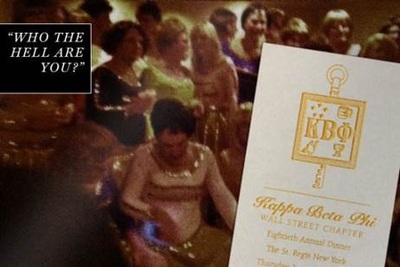
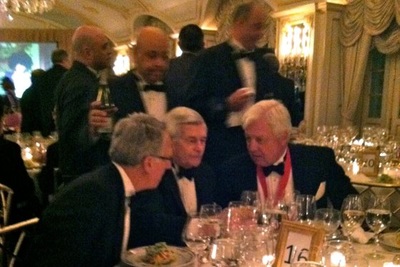


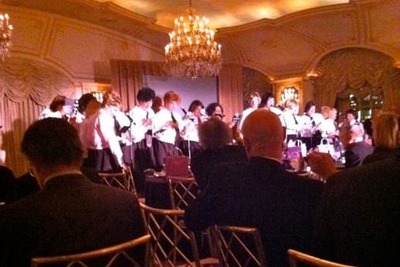
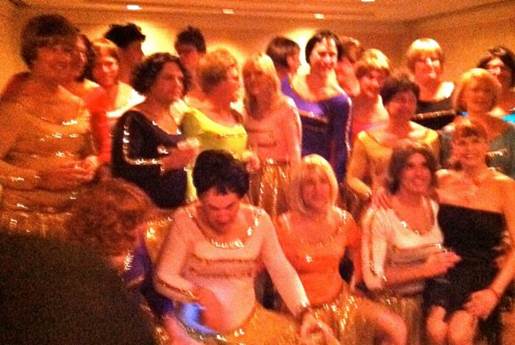
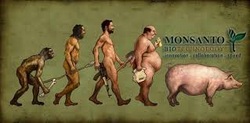
 RSS Feed
RSS Feed
